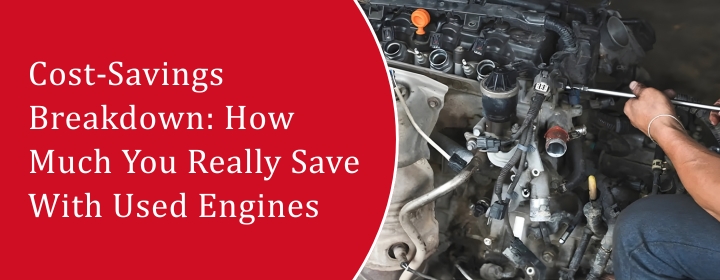
Cost-Savings Breakdown: How Much You Really Save With Used Engines
This fact cannot be denied that getting your vehicle repaired, can be a burden on your pocket. So, when your engine stops working, the 1st and foremost thing that you experience is panic. And then comes the big question: do you buy a new one or look for a used engine? Most people don’t realize just how much they can actually save by going the used route. It’s not just “a little cheaper.” The difference can be huge, depending on what you drive and where you buy. In this blog, we will specify how you can smartly save money while getting a good-quality used engine installed in your vehicle.
1. The Real Cost of a New Engine
Buying a new engine sounds simple – until you see the bill. For most cars, a new engine (not rebuilt, not used – brand new) can easily run between $4,000 and $10,000, sometimes even more if it’s a newer or luxury model. That’s before adding labor. The installation can cost $1,000 to $2,000, depending on the mechanic.
So, let’s say your total repair bill could touch $6,000 to $12,000. That’s nearly what a used car might cost. For most people, spending that much doesn’t make sense. That’s where used engines for sale come in – they give you a middle ground between junkyard scraps and unaffordable new parts.
We at beelinesautomotive.com, make sure that people can find used engines that are tested, inspected, and sometimes even come with a short warranty. You’re basically getting a working engine that has already proven itself in another car – but for a fraction of the price.
2. So, What Do Used Engines Actually Cost?
This part surprises a lot of people. A good used engine for a regular car, like a Honda or Toyota, might cost anywhere from $800 to $2,500. For larger or luxury models – maybe a BMW, Ford truck, or Lexus – you might be looking at $2,500 to $4,000.
Even after you add installation costs, your total stays between $2,000 and $5,000. That’s about half the cost of new. Sometimes even less. And no – that doesn’t mean you’re buying junk. Many of these used engines for sale come from vehicles totaled in accidents or retired for reasons other than engine failure.
Being a reliable source
we often check compression levels, oil condition, and mileage. These things matter because they tell you how much life the engine still has left. So, you’re not just saving money — you’re buying smart.
3. What’s Behind the Savings?
Let’s break down where the savings really come from:
- Lower upfront cost: Obvious one. You’re not paying for a freshly built engine with brand-new parts and shipping costs. You’re getting something already built and proven.
- Less depreciation: A new engine starts losing value the moment it’s installed. A used engine doesn’t have that problem — its biggest drop in value has already happened.
- Cheaper repair compatibility: Used engines often work well with other secondhand parts. For example, if your radiator or mounts need replacing, you can find used versions of those too, which keeps the whole job affordable.
- Reduced downtime: When you buy new, you often wait weeks for shipping or back orders. With used engines for sale, you can get that within a few days.
All these bits add up. Most drivers who go the used route save around 40% to 60% compared to replacing their engine with a new. And if you’re doing the swap on an older car – something worth $5,000 or less – it’s the only move that really makes sense financially.
4. What to Check Before You Buy
Now, here’s where you need to pay attention. Not every used engine is a deal. Some can end up costing more if you don’t ask the right questions.
Here’s what to check:
- Mileage: Lower is better, obviously.
- Compression test results: This shows how strong the cylinders are. Low compression means it’s not good to be used.
- Warranty: Even a 30- or 90-day warranty is better than nothing. It shows the seller stands behind their product.
- Engine history: Try to find out if it came from a collision, a flood, or just an old vehicle. Flood engines can look fine but fail early.
- VIN matching: Always match the VIN or engine code to your own car model to avoid compatibility issues.
If you’re not sure how to check all that, many online sellers can help match your car with the correct used engine based on your VIN. That takes away a lot of the guesswork and makes sure you’re getting something that fits right the first time.
5. The Bottom Line
A used engine is a practical way to fix your vehicle without spending too much. But the most important thing is to do research from your end and then purchase the perfect part for your vehicle. You can easily save half, sometimes even more, depending on your car’s make and model.
In simple terms, if your car’s body and transmission are still solid, a used engine can give it a second life for thousands less.
To sum it up, you’re not cutting corners — you’re cutting unnecessary costs. And that’s what good car maintenance is all about: balance, not overspending.
If you’re thinking about making that move, check out the listings at beelinesautomotive.com , we make it easy to compare, verify, and choose the right used engine for your vehicle without any pressure.
Because when it comes down to it, saving money doesn’t mean settling for less. It just means buying smart.